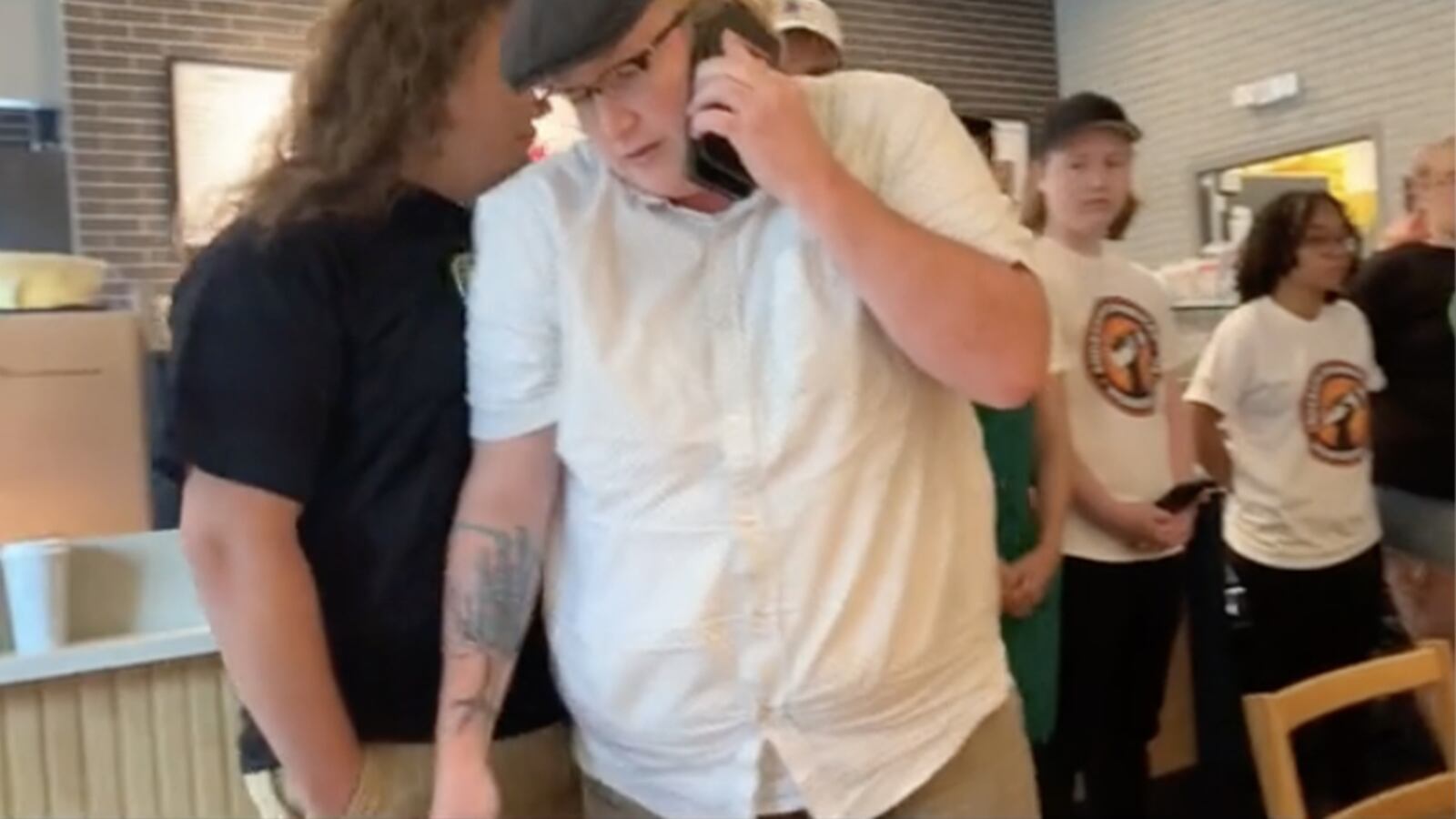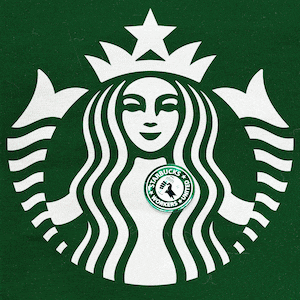A bizarre kidnapping allegation against unionized Starbucks workers in South Carolina is the latest salvo in the company’s aggressive union-busting campaign.
The incident, which took place on Aug. 1, was manager Melissa Morris’s first day working at the Anderson Starbucks store.
She was walking into a volatile situation. Like many Starbucks workers across the country, baristas at the store had become increasingly dissatisfied.
“We were tired of how management was treating us, not listening to our complaints,” says Aneil Tripathi, 19, who took his first ever job in the Anderson store and led the unionization effort. “They haven’t stepped a foot on the floor, they probably never made a drink in their life. And they’re telling us how to do our jobs.”
Tripathi recalled how on one particularly busy Sunday he found the store understaffed—three people were doing the job of six. He called the district manager for help. It was her day off and he could hear the TV on in the background. “There’s not much I can do,” she told him. That day he sent an email to Starbucks Workers United—an independent labor union that has been organizing workers nationwide—asking for advice on how to unionize the store.
The unionization campaign at the Anderson store was a wild success. The May 31 vote was unanimous, with all 18 workers voting to join. “It was kind of a big deal,” Tripathi says, because northern South Carolina is very pro-Trump and historically anti-union.
In response to the vote, workers say, management cracked down on the Anderson store. They were told they couldn’t wear pro-union T-shirts and management started unilaterally cutting their hours, as well as shortening the store’s opening times.
Starbucks has been scrambling to respond to a wave of stores unionizing nationwide. In an effort to stem the flow, the company announced on May 3 that it would roll out a new packet of benefits on Aug. 1 but there was a catch. Workers at unionized stores would not be eligible for the new perks. Instead, each would have to negotiate their own contract individually.
The Anderson baristas had gone out on strike twice last month but this edict was the final straw.
“Our store was very frustrated,” said Tripathi. The baristas reacted angrily to news they would be excluded from the very benefits they had been demanding and felt like it was retaliation for organizing.
So they began to plan a “March on the Boss,” a federally protected direct action in which workers present their demands directly to their manager. They drafted a letter asking for new equipment for the store and demanding that they receive the same pay raise being given to non-unionized stores.
They planned to take action on Aug. 1—the day the new benefits were rolled out.
Originally, the Anderson workers had planned to confront their store manager, but she quit after the first strike. Their new manager, Melissa Morris, started Aug. 1.
“Unfortunately for her that was the day it fell on,” says Tripathi.
The workers gathered around Morris and read their letter aloud.
“We are not going to move until some action is taken for our raise. No work is being done on the floor, and no customers are being served,” one worker told Morris, in audio published by More Perfect Union on Twitter.
“We carried this company on our shoulders through the pandemic at the risk of our health and loved ones’ health,” another worker tells Morris in the recording, “and we have nothing to show for it.”
“We weren’t menacing,” says Tripathi, “We were a good distance away from her.”
@sbworkersunited When workers stand up together, workers win. @Starbucks must end their union busting tactics now. #management #unionbusting #uniontok #marchontheboss #southcarolina ♬ original sound - SBWorkersUnited
Video of the incident, released by Starbucks Workers United, shows Morris sitting at a table in the store, surrounded by 10 workers, while another employee films the situation. While speaking to the district manager on the phone, Morris stands up, brushes past one of the workers, and stops before reaching the door. Workers followed her to the door, but did not block her path, Tripathi says.
“No one was blocking the door,” he told The Daily Beast. “The door was unlocked.”
“Will you let me exit the building?” Morris asks the workers, still on the phone.
“Yes,” Tripathi answered.
The entire interaction lasted around six minutes, according to audio of the incident.
Two days later, Morris filed a report with the Anderson County Sheriff’s Office alleging that her employees had kidnapped her at the store, and “would not let her leave until they got a raise.”
“One employee also assaulted her,” Morris told police, and the incident was “captured on video,” according to a police report viewed by The Daily Beast.
Morris was not immediately available for comment.
Police came to the store and interviewed workers about the kidnapping allegation.
“They saw that we’re not criminals, we’re people who make coffee,” Tripathi says.
On Aug. 6, Tripathi and 10 other workers at the store found out they were being suspended.
The store manager “felt threatened and unsafe as a result of conduct by 11 store partners,” Starbucks said in a statement, adding that they had been advised by law enforcement to suspend workers “until their investigation is complete.”
“They want to make an example out of us,” says Tripathi, who sees the suspension as direct retaliation for organizing.

Buttons showing support for a Starbucks Union are seen at the Workers United, an affiliate of the Service Employees International Union, offices in Buffalo, New York.
Brendan McdermidThe Anderson County Sheriff’s Office said a detective is still investigating the case and it has not been determined yet if charges will be filed.
“Bossnapping,” or taking your boss hostage during a labor dispute is an unusual tactic, but occurs occasionally in France, where workers have been known to kidnap their employers for several days. The strategy is unknown in the United States.
“I cannot believe I have to say this, but workers who are organizing for better working conditions should not have to deal with their boss accusing them of kidnapping and assault,” Senator Bernie Sanders tweeted on Aug. 8, “How outrageous. This campaign of rampant union-busting from Starbucks has got to end.”
The kidnapping charge is just the latest example of Starbucks’s aggressive response to union organizing by its workers since the campaign began in Buffalo, New York, in 2021. To date, 223 Starbucks stores have voted to unionize.
Tripathi believes Morris filed the police report on the advice of Starbucks management, who are being counseled by Littler Mendelson—the high-powered law firm Starbucks has brought in to help them.
The firm, which has also represented Apple and Trader Joes, is notorious for its aggressive union-busting tactics.
To date, Starbucks has fired over 85 pro-union workers at stores across the country, according to Starbucks Workers United, who also say the company is engaged in underhand, illegal anti-union tactics, including spreading disinformation, closing stores, intimidating workers, retaliating against those who organize, and attempting to halt elections.
On Thursday, the National Labor Relations Board, the federal body that adjudicates disputes between unions and management, found that Starbucks had violated the law when they fired seven union-involved baristas in Memphis, Tennessee. A judge ordered Starbucks to reinstate the workers and to “cease and desist from unlawful activities.” Starbucks said it disagrees with the verdict and plans to appeal, according to a statement posted to their website.
The union has filed 291 unfair labor practice charges with the NLRB against Starbucks since their organizing campaign began. The Board has already found merit in 87 of these allegations, accusing Starbucks of illegally interfering with and coercing workers, and taking retaliatory action against organizers.
But it may take months or even years for the Board to wade through all the complaints, and their enforcement power is limited.
“It really is kind of an amazing anti-union crime wave from this company that professes to be a progressive employer and to care about its people,” says John Logan, a professor and director of labor and employment studies at San Francisco State. Logan believes the harsh tactics Starbucks is employing are part of Littler Mendelson’s anti-union playbook.
“Hiring Littler Mendelson is like planting a flag and saying: we’re going to fight this union to the death,” Logan says, “It has unlimited resources with which to fight this campaign.”
Littler Mendelson, founded in 1942, has grown into an enormous international firm, employing thousands of lawyers across the world. The firm specializes in union-avoidance. It made more than $658 million in gross annual revenue in 2021, according to its website. In June, the firm handed out average bonuses of $10,000 to high-performing employees, according to the legal blog Above The Law.
At least 50 Littler Mendelson lawyers, spread across 17 states, have been working for Starbucks in just the last three months, according to a Daily Beast review of NLRB filings since June 2022. At least three of these lawyers are also representing Trader Joes, which is engaged in its own battle against unionization efforts at its stores.
“It might be the most expensive anti-union campaign of all time,” Logan says.
On Friday, Starbucks workers at stores on North Broadway in Chicago, and in Clifton Park, New York, voted overwhelmingly in favor of unionizing, while a vote at a separate location in Louisville, Kentucky, was much closer with 10 people voting yes, 7 voting no, and 3 ballots being challenged.

Starbucks CEO Howard Schultz.
Stephen BrashearStarbucks CEO, billionaire Howard Schultz has taken an active role in anti-union efforts, blaming outside agitators for stoking resentment among employees. Last month, he told a New York Times event that he could not accept a future for the company with a union involved, “because we have a different view.”
In Schultz’s 1999 memoir, Pour Your Heart Into It: How Starbucks Built a Company One Cup at a Time, Schultz recalls watching unionization efforts at Starbucks in the late 1980s.
“There is no more precious commodity than the relationship of trust and confidence a company has with its employees,” he wrote, “Once they start distrusting management, the company’s future is compromised.”






